‘This is a good film, very encouraging. We need this type of interaction in our country at this time. I’m very glad that the Imam and the Pastor are here in person; it has made a huge difference.’ - Tiduok Arthur, Religious Affairs Special Adviser to the President of South Sudan
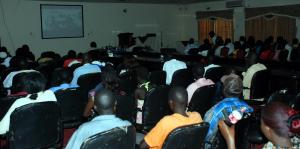 The protagonists of the award-winning documentary film The Imam and the Pastor [1], Imam Muhammad Ashafa and Pastor James Wuye, and the film’s co-Producer Dr Imad Karam were guests of the Directorate of Religious Affairs of the Government of South Sudan in Juba from 29 October to 2 November 2010. The fourth guest Mrs Amina Dikedi-Ajakaiye, a Nigerian widely travelled in Africa, helped conduct workshops for women on a previous visit to Juba and Khartoum.
The protagonists of the award-winning documentary film The Imam and the Pastor [1], Imam Muhammad Ashafa and Pastor James Wuye, and the film’s co-Producer Dr Imad Karam were guests of the Directorate of Religious Affairs of the Government of South Sudan in Juba from 29 October to 2 November 2010. The fourth guest Mrs Amina Dikedi-Ajakaiye, a Nigerian widely travelled in Africa, helped conduct workshops for women on a previous visit to Juba and Khartoum.
The visit comes at a time of heightened political tension in the whole country, as South Sudan prepares for the January 2011 Referendum on whether to remain part of a united Sudan or to secede. The visitors were invited to strengthen interfaith dialogue and reconciliation in the run-up to the Referendum and its aftermath.
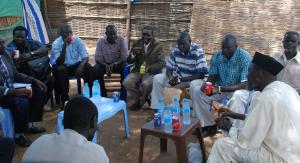 On the day of arrival, Imam Mohammed Ashafa addressed the 400-strong Friday Prayer congregation at Juba’s main mosque. He then conferred with the Imam of the mosque on the status of the Muslim community in Juba. South Sudan has a Muslim minority while the North has a Christian minority. There is concern for both minorities, lest violence erupts in the event of either North or South rejecting the result of the Referendum.
On the day of arrival, Imam Mohammed Ashafa addressed the 400-strong Friday Prayer congregation at Juba’s main mosque. He then conferred with the Imam of the mosque on the status of the Muslim community in Juba. South Sudan has a Muslim minority while the North has a Christian minority. There is concern for both minorities, lest violence erupts in the event of either North or South rejecting the result of the Referendum.
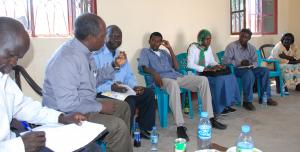 The next day, the team met outreach workers of the Sudan Organization for Non-Violence and Development (SONAD). During the three-hour meeting, Imam Ashafa and Pastor James shared their experience and encouraged SONAD to turn challenges into opportunities. ‘We don’t have only four gospels. You are the fifth gospel’ said Pastor James Wuye. The guests answered questions on whether religion really is the source of war, how believers can help policy-makers defuse tension, and the sensitive interpretation of verses in the Holy Books.
The next day, the team met outreach workers of the Sudan Organization for Non-Violence and Development (SONAD). During the three-hour meeting, Imam Ashafa and Pastor James shared their experience and encouraged SONAD to turn challenges into opportunities. ‘We don’t have only four gospels. You are the fifth gospel’ said Pastor James Wuye. The guests answered questions on whether religion really is the source of war, how believers can help policy-makers defuse tension, and the sensitive interpretation of verses in the Holy Books.
The team then exchanged views at the South Sudan Council of Churches. SSCC are planning prayer meetings before and during the Referendum and are also involved in interfaith dialogue.
The official launch of the film in South Sudan took place in the Conference Hall of Nyakuron Cultural Centre, Juba. The audience of 200 included Angelina Teny, former Federal Minister of State for Energy and Mining, and Tiduok Arthur, Special Adviser on Religious Affairs to the President of South Sudan. The film was followed by lively discussion, and applause from many young men and women for the Imam and Pastor’s answers to their questions.
In his closing remarks, Rev Tiduok Arthur praised the film: ‘We need this type of meeting in our country at this time. I’m very glad that the Imam and the Pastor are here in person; it has made a huge difference.’ He also stated that the constitution of South Sudan is secular so that ‘we can protect freedom of religion’.
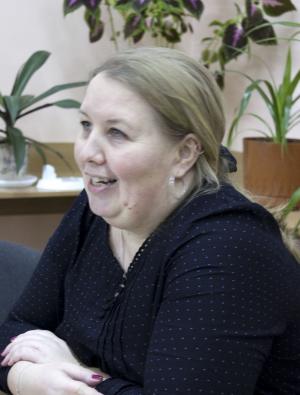 The chairman of the event, Moses Telar Cindut, Director of Religious Affairs at the Ministry of Social Welfare and Religious Affairs concluded: ‘We need stories like The Imam and the Pastor in order to help the Sudanese people develop open and constructive dialogue, for sustainable peace and the enhancement of national unity. The event was covered by Al-Akhbar and Ajras Al-Hurriah newspapers as well as the bimonthly magazine Al-Tayar.
The chairman of the event, Moses Telar Cindut, Director of Religious Affairs at the Ministry of Social Welfare and Religious Affairs concluded: ‘We need stories like The Imam and the Pastor in order to help the Sudanese people develop open and constructive dialogue, for sustainable peace and the enhancement of national unity. The event was covered by Al-Akhbar and Ajras Al-Hurriah newspapers as well as the bimonthly magazine Al-Tayar.
The following morning, Sunday, Pastor James Wuye, accompanied by Mrs Amina Dikedi-Ajakaiye, went to an Evangelical Church. He shared with the congregation the story of his reconciliation with Imam Ashafa and the basis of their joint mediation work. He urged them to stay peaceful during the referendum: ‘No matter what the final result of the referendum is, don’t revenge and don’t shed blood. Avoid violence’. Amongst his audience were visiting pastors from three other churches. Each was presented with a DVD copy of The Imam and the Pastor.
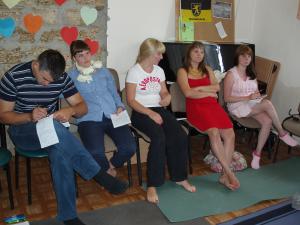 At All Saints Anglican Cathedral in Juba Pastor James met the Archbishop of Sudan, Daniel Deng Bul, and the Dean of the Cathedral. The Archbishop spoke about the results of a visit by a diverse group of Sudanese religious leaders to the UK, the US, and the UN. Pastor James presented the film to him and the Dean and to the Director of the Anti-Corruption Commission who came to the service. Pastor James told the congregation about the challenges he and Imam Ashafa faced in Nigeria, and how they found a way to promote peace.. This was very well received. The congregation included three Government Ministers and the Chief Justice of South Sudan.
At All Saints Anglican Cathedral in Juba Pastor James met the Archbishop of Sudan, Daniel Deng Bul, and the Dean of the Cathedral. The Archbishop spoke about the results of a visit by a diverse group of Sudanese religious leaders to the UK, the US, and the UN. Pastor James presented the film to him and the Dean and to the Director of the Anti-Corruption Commission who came to the service. Pastor James told the congregation about the challenges he and Imam Ashafa faced in Nigeria, and how they found a way to promote peace.. This was very well received. The congregation included three Government Ministers and the Chief Justice of South Sudan.
In the evening, the film was screened at the College of Arts, Music and Drama at the University of Juba. The 60 students who attended engaged in questions and answers. The Dean of the College congratulated the film makers: ‘We enjoyed the film, and its story of reconciliation has inspired us’. In his closing remarks, Moses Telar Cindut, Director of Religious Affairs at the Ministry of Social Welfare and Religious Affairs, told the students that as a former guerrilla commander he once fought against the Muslims. ‘Let’s make Juba a well of peace,’ he urged the students.
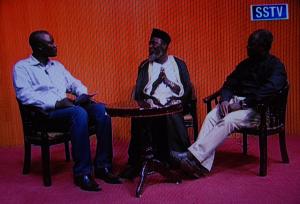 On Monday the team went to South Sudan TV and met the Director. They discussed the role of the media and SSTV in the upcoming referendum and how a peaceful process can be achieved. They were invited to take part in the Issues live talk show in the evening. Then there was a meeting with the Under Secretary of the Ministry of Social Welfare and Religious Affairs Nathan Wojia Pitia. The Ministry is responsible for promoting religious tolerance, and supporting faith groups in projects geared towards social and economic development.
On Monday the team went to South Sudan TV and met the Director. They discussed the role of the media and SSTV in the upcoming referendum and how a peaceful process can be achieved. They were invited to take part in the Issues live talk show in the evening. Then there was a meeting with the Under Secretary of the Ministry of Social Welfare and Religious Affairs Nathan Wojia Pitia. The Ministry is responsible for promoting religious tolerance, and supporting faith groups in projects geared towards social and economic development.
The team then visited the leadership of the Muslim community in Juba. It was a very lively three-hour meeting, with a break for noon prayers, finishing with lunch at 4 pm. Imam Ashafa challenged those present about their preparations for the Referendum. What plans did they have to work alongside their Christian counterparts? The community leaders said they keep hearing the Christians complaining how deeply they were hurt by the Muslims in the past. Now there is fear that some may find an opportunity to retaliate. Jumaa Saeed Ali, Deputy Chair of the Religious Leaders Council of South Sudan, said ‘We want now to learn from you Nigerians. Our plan is to remove the misconception that the Christians have, through dialogue and workshops.’ He added there is also need for a dialogue on reconciliation between the Christians and Muslims together on the one hand and the Government of South Sudan on the other.
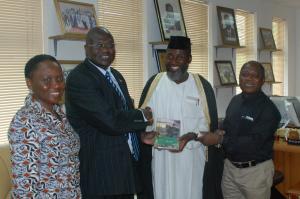 Next day the Imam and the Pastor were welcomed by the Vice President of the Government of South Sudan, Dr Riak Machar, at his office for a 40-minute talk. The Government of the South Sudan (GOSS) has set up a Referendum Task Force to oversee the pre- and post-referendum processes. This is a ministerial committee with technical sub-committees. The first prepares GOSS for eventual take-over of an independent country. A second is negotiating with Khartoum on security and wealth-sharing. A third committee oversees the remaining provisions of the Comprehensive Peace Agreement (CPA) which have not been implemented. There is also an economic cluster which includes currency, banking, assets and debts. At the end Dr Machar was presented with copies of the Imam and the Pastor and the new documentary film from FLTfilms, An African Answer [2].
Next day the Imam and the Pastor were welcomed by the Vice President of the Government of South Sudan, Dr Riak Machar, at his office for a 40-minute talk. The Government of the South Sudan (GOSS) has set up a Referendum Task Force to oversee the pre- and post-referendum processes. This is a ministerial committee with technical sub-committees. The first prepares GOSS for eventual take-over of an independent country. A second is negotiating with Khartoum on security and wealth-sharing. A third committee oversees the remaining provisions of the Comprehensive Peace Agreement (CPA) which have not been implemented. There is also an economic cluster which includes currency, banking, assets and debts. At the end Dr Machar was presented with copies of the Imam and the Pastor and the new documentary film from FLTfilms, An African Answer [2].
Finally the four visitors shared their Juba experiences with the Minister of Human Resources. Mrs Mary Yak, until last April represented a South Sudan constituency in the Federal Parliament in Khartoum. She spoke candidly of the challenge she and her new Ministry face in how to reinforce trust across South Sudan’s ethnic divides.
As the team left, the deputies of Imam Ashafa and Pastor James, Rev Bitrus Dangiwan and Imam Mohamed Sani arrived in South Sudan to give training in Juba and Malakal. Aimed at Muslim and Christian religious leaders, this will focus on peace and reconciliation using The Imam and the Pastor DVD.
This October invitation paralleled a visit by Imam Ashafa and Pastor Wuye and others to Khartoum in January 2010 as guests of the Sudan Inter-Religious Council.
Amina Dikedi-Ajakaiye and Imad Karam
